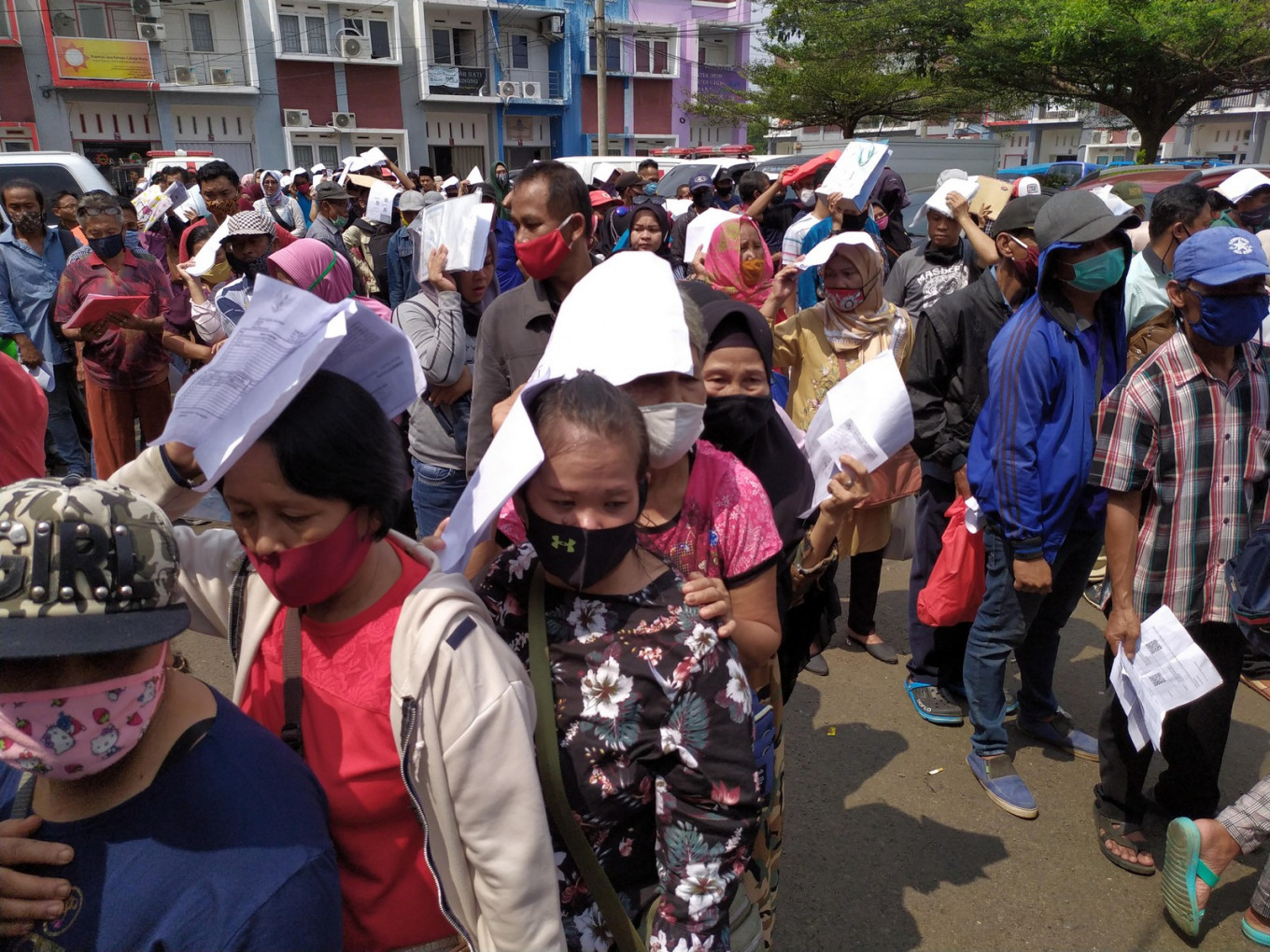Popular Reads
Top Results
Can't find what you're looking for?
View all search resultsPopular Reads
Top Results
Can't find what you're looking for?
View all search resultsShow them the money, fast
With so many handout programs, Jokowi can certainly hope that people would have enough sustenance to weather the pandemic because any source of discontent could create political instability and security threats.
Change text size
Gift Premium Articles
to Anyone
 People line up to receive government social cash transfers (BST) at an office complex in Cibinong, Bogor regency, West Java, on July 20. The Social Affairs Ministry is working with post offices to channel financial assistance to underprivileged residents from May until July. Each recipient will receive Rp 600,000 (US$42) per month. JP/P.J. Leo (JP/P.J. Leo)
People line up to receive government social cash transfers (BST) at an office complex in Cibinong, Bogor regency, West Java, on July 20. The Social Affairs Ministry is working with post offices to channel financial assistance to underprivileged residents from May until July. Each recipient will receive Rp 600,000 (US$42) per month. JP/P.J. Leo (JP/P.J. Leo)
I
t’s a question of when, not if. Given the duration and the severity of the COVID-19 pandemic, even the most liberal policymakers have realized that government intervention is the only lifeline that can save millions of souls.
President Joko “Jokowi” Widodo of all people, a populist politician whose campaign promise was to help the little people, knows this very well. Even long before the pandemic hit, President Jokowi rolled out policies for more government handouts to the less well-off. These handouts range from cash assistance to help pay for basic foodstuff and school supplies to a preemployment scheme that promises to give cash to people looking for jobs.
Since the onset of the pandemic, Jokowi has doubled down on that safety net program. In fact, when announcing the latest round of COVID-19 mobility curbs earlier this week, Jokowi tripled down on it. There are now eight aid programs designed to ease the burden of everyone struggling to deal with the economic fallout from coronavirus curbs. These programs come in the form of the usual cash handouts, as well as new schemes, like the provision of rice and incentives for small businesses.
The motive, of course, is not always altruistic. With so many handout programs, Jokowi can certainly hope that people would have enough sustenance to weather the pandemic because any source of discontent could create political instability and security threats. The overreaction that we saw from the National Police in responding to a rumor of an “endgame” political rally last week is an indication that the government certainly did not want to leave anything to chance when it comes to political stability.
A list of priorities is one thing, delivery is quite another. From last week’s episode in which Social Affairs Minister Tri “Risma” Rismaharani snapped during a visit to Tuban, East Java, we know that everything is not alright. What she found was that some people had only received two packages of cash handouts instead of the promised three packages covering the months of July, August and September. In other cities, some even haven’t received government handouts from the previous packages, and there are many other reports like this. Local officials claimed this has something to do with poor data on recipients or an absence thereof.
And there is, of course, the problem of corruption. Most recently, the Corruption Eradication Commission (KPK) questioned numerous witnesses, including soap opera star-turned deputy regent Hengky Kurniawan, for their alleged roles in the procurement of goods used as COVID-19 social aid.
This comes on the heels of a mega corruption case involving then-social affairs minister and Indonesian Democratic Party of Struggle (PDI-P) politician Juliari Batubara, who is now standing trial for allegedly siphoning off Rp 2.7 trillion (US$186.36) from the social aid program.
Anger over this high-profile scandal, compounded by mass pauperization as the effect of the pandemic, could easily be turned into a tinderbox that could spark a political conflagration.
The government needs to act fast to rectify the problems and allow for a quick delivery of social aid. The pandemic will be long, but people’s patience could run short.









